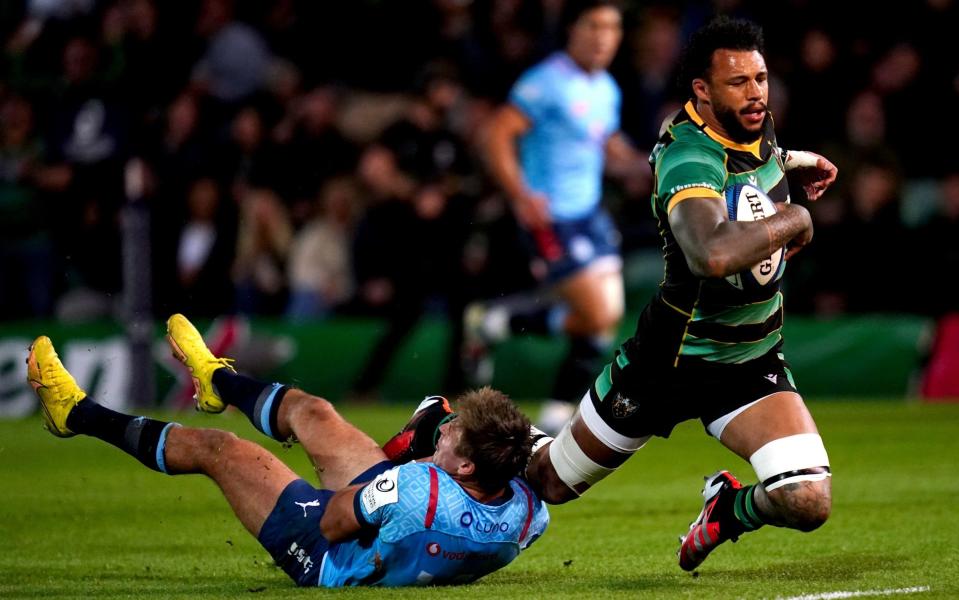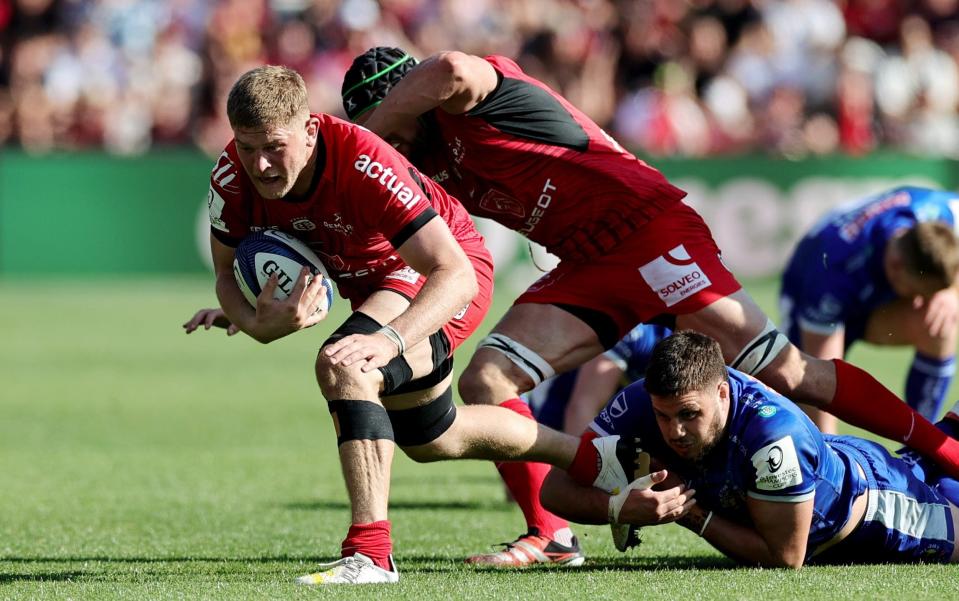Forget attacking brilliance, defence will still decide Champions Cup semi-finals

Accepted wisdom suggests that knockout games are cagey, claustrophobic affairs. If ever there were a quartet of semi-finalists to blow away that truism, this season’s Champions Cup has found them.
Leinster, Northampton Saints, Toulouse and Harlequins are all synonymous with ambition and tries that captivate spectators. While they possess other qualities, effective attack is a trait they all share. Omar Mouneimne, the Exeter Chiefs defence coach, can articulate the nuances of each. He has faced Saints, Toulouse and Harlequins this season and was a colleague of Jacques Nienaber, now Leinster’s honcho, at the Stormers between 2008 and 2010.
Mouneimne explains how Northampton and Harlequins isolate individual defenders with multiple runners in motion, creating doubt and generating “lightning quick” rucks when opponents are forced to make one-on-one tackles. Leinster’s intricate phase-play is “tight” and “aggressive”, hinging upon work-rate and “dominant clean-outs” at the breakdown.
The “layered” threats of Toulouse, who pulled away from Exeter in the quarter-final to record a 64-26 victory, are fresh in Mouneimne’s mind. The inimitable Antoine Dupont, in harness with bruising forwards like Emmanuel Meafou, gives them a different dimension.
“All French teams can play up your guts, and that is the type of rugby that the Premiership doesn’t see,” Mouneimne says. “Premiership attacks are organised with lots of shape, ball-players at the line, decoys, width across the park. The French can do that if they want to, but they’re notorious for an up-the-guts game. That’s a pick-and-go through the ruck, a pop or an offload, Dupont beating two defenders around the ruck or scooting to the left and then to the right and passing to someone who pops it straight back to him.”
Stay too narrow against Toulouse and there is a grave danger of being outflanked. Leave space around the fringes and Dupont will cause havoc. Do not cough up possession, either. Toulouse have scored five tries directly from turnovers this Champions Cup campaign, more than any other semi-finalist. “No one can attack in transition like them,” Mouneimne adds. “Bish, bash, bosh and they’re gone.”

More high-scoring shoot-outs, such as Harlequins’ 42-41 win over Bordeaux Bègles in the quarter-final, are quite possible. As Mouniemne puts it, none of the sides will be shy. But rugby union is chiefly about rhythms. For instance, brawny teams may aim to slow things down by kicking and imparting pressure in the breakdown and set-piece battles. Disruptive defence is another way to control rhythm. And simply aiming to contain opponents is no longer enough.
“I think people are starting to wake up to that; that if you just contain, you can end up with problems,” Mouniemne says. “The attack is looking for the impetus, looking at a defence and going: ‘right, we could cut you open at the back of a line-out or run you offside, kick to the corner and maul’. They’re always looking for that edge to put you under duress. As a defence, you have to look for those pressure points, too.
“For example, [Alex] Mitchell and Dupont are massive threats. You can’t think: ‘He’s in front of me, I don’t want him to show and go, so I’ll just control him’. You have to think of how you can hunt them down and you can’t be afraid to do that. If you put them under duress and they make a crap pass, the next guy is under duress.
“That’s the puzzle that has to come together, otherwise they won’t have moments where they feel their plans aren’t working, where they think: ‘We could capitulate here if we’re not careful’. If you don’t fire warning shots, they’ll do what they want the whole game.”
Leinster and Northampton, meeting in front of 82,000 at Croke Park on Saturday, both prioritised defensive improvements for this season. Nienaber arrived in Dublin as Stuart Lancaster’s replacement after guiding the Springboks to a second straight World Cup title.
Carrick Blake, an analyst for Cambridge RFC, developed a ‘passes per defensive action’ metric and has seen Leinster surge up that ranking among teams in the Top 14, the Premiership and the United Rugby Championship. Essentially, they are stifling attacks and causing them to complete fewer passes thanks to line-speed, blitzing wings and breakdown spoiling.
Jordan Larmour’s jackal turnover in the 13th minute against La Rochelle paved the way for a cathartic, 40-13 triumph over Leinster’s nemesis in the 2022 and 2023 finals. The evasive wing is not recognised for defensive tenacity. A week previously, Robbie Henshaw’s interception try had scuppered Leicester Tigers at a crucial juncture of the last-16 tie as well, yielding a 14-point swing.
“Jacques hasn’t had much time, but I can see his fingerprints,” Mouniemne continues. “Leinster are fast off the line, they stay square, they hit hard, they’re getting into defensive breakdowns a lot and you can see that he’s got that grit that he enjoys. He makes defence very personal. He’s a very detailed guy.
“Definitely, there’s been a turnaround and, from a mental standpoint, he will have them exactly in the right frame of mind to create carnage in defence – to create pressure points so that Saints think: ‘Oooph, this is heavy work’. He’s going to ensure that, I’ve no doubt. He’s a great coach.”
Lee Radford has made an impact in the East Midlands since joining Phil Dowson’s staff as well. Mouniemne has discerned a renewed toughness about Northampton, who are “hitting hard” in the tackle. Courtney Lawes will probably need to produce a monumental shift for Saints to spring an upset. The good news for them is that their old warhorse did precisely that at a windswept Thomond Park in January. His steel complements the verve of Mitchell, Fin Smith, George Furbank, Tommy Freeman and co. Northampton kick a great deal, too, moving out of their half swiftly and efficiently.
Onto Sunday’s clash, which will be awash with elite jackallers. The hosts boast Julien Marchand, François Cros and Jack Willis; all of them master groundhogs. Leading that area for Harlequins is the wily Will Evans, superb against both Glasgow Warriors and Bordeaux to set up this semi-final. Alex Dombrandt is an underrated accomplice, with André Esterhuizen another fierce scavenger. Tries seem inevitable.

Defensive contributions, as ever, will govern momentum. Harlequins, thrashed 47-19 when these rivals met at the Twickenham Stoop back in January, need to stop Toulouse from surging “up the guts” and to hope they can keep the scoreboard spinning.
“Quins are very dangerous, jeepers,” Mouniemne finishes. “You hear them saying phrases like ‘we’ll swing the bat and see what happens’. Against Toulouse, you have to understand that they can do the same. They’ve got a lot of X-factor around the park and a heavy set piece. If you want to buy a lottery ticket against them and see who can play wilder, you’d be shocked that Toulouse can be more pragmatic than you might think, while also being able to punish you on the fly. That’s what we learned.
“You make two oopsies in a row, they score 14 points and then they tighten the screw with Dupont playing for territory. Then later, he’ll see a gap and go for it. They can play both ways. You don’t really want to be behind against these dudes… even if you’re Quins!”
At Stade Chaban-Delmas, Harlequins were sharp enough to build a 28-12 lead, which allowed them to squeeze through. Though they conceded 41 points, there was enough tackling and breakdown disruption, with formidable scrummaging thrown in, to eke out victory. For all four sides, semi-final weekend will be about seizing opportunities; in defence as well as attack.

